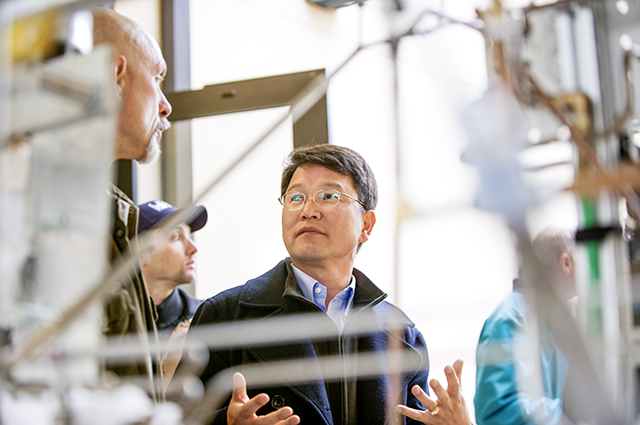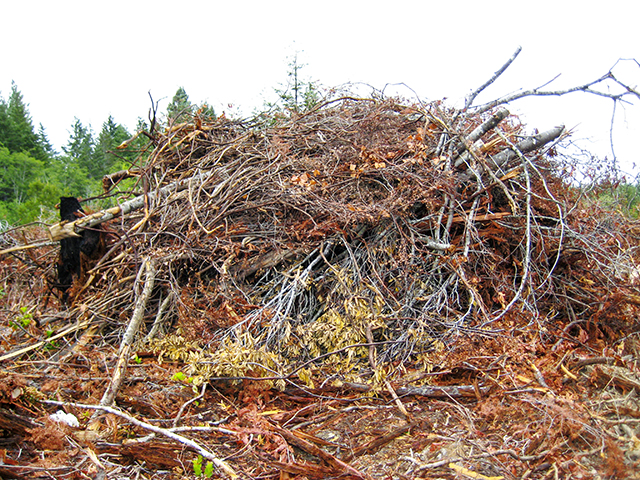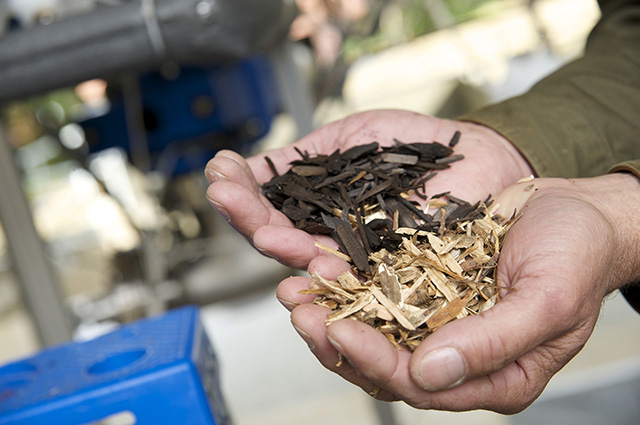The grant is part of the Biomass Research and Development Initiative, a presidential program that supports renewable energy research in the rural United States. It is one of the largest grants ever received by HSU.
Beginning this spring, a team of academics, business people and land managers led by HSU Forestry Professor Han-Sup Han will build on existing research on conversion of woody biomass into renewable fuel and other valuable products. Woody biomass is the name given to limbs, treetops and other waste materials left on the forest floor after timber harvesting. It is the world’s largest source of bioenergy and accounted for 5 percent of U.S. energy consumption last year.

As an alternative form of energy, woody biomass has the potential to reduce U.S. dependence on foreign energy, decrease the risk of forest fires and promote economic development in rural, forest-dependent communities in the western United States.
Woody biomass is already an important renewable energy resource in rural northern California, according to HSU’s Schatz Energy Research Center (SERC). It is used for central power generation and as a home heating fuel. However, further research is needed to solve a number of technical problems and bring new biomass energy technologies to market.
The grant will allow researchers to explore those problems and three important areas related to woody biomass: feedstock supply, mobile conversion technologies, and economic life cycle analysis. HSU graduate students and postdoctoral researchers will assist each group.
The first team will be led by Han, the lead principal investigator on the grant. Han’s group will focus on the economics of converting forest residue into high quality feedstocks. Researchers will conduct experiments and develop biomass recovery systems that improve the economics, accessibility, and production of quality feedstocks from forest residues.

“The effective use of mobile biomass conversion technologies has the potential to reduce U.S. dependence on foreign oil, lower greenhouse gas emissions and promote economic development in rural parts of the United States,” Han says. “Removing woody biomass also has the potential to improve forest health and reduce the risk of wildfires, particularly in California.”
The second group, led by SERC Lab Director Arne Jacobson, will study biomass conversion technologies that convert slash or wood chips into biomass fuels and products at or near collection sites in the forest. Methods will include gasifaction to produce biochar; pyrolysis to produce torrefied pellets, and densification to produce briquettes.
“Due to the high cost of collection and transportation, woody biomass is a promising but widely untapped source of renewable energy,” says Jacobson. “One of the goals of our research is to investigate mobile biomass conversion technologies, which will reduce the cost associated with the transportation of woody biomass and increase the value of processed products by converting forest residue at or near field collection sites.”
Ted Bilek, an economist with the USDA Forest Service, will lead the third group. Bilek’s team will perform economic analyses and conduct a life cycle analysis documenting the economic benefits and other environmental effects related to utilizing forest residues.

“It’s not enough that the technologies work and produce energy,” Bilek says. “They also need to be economically viable, socially acceptable, and environmentally sustainable. These are the focuses of our group. Our research will also help to highlight areas that offer the greatest potentials to improve returns and to ensure long-term sustainability.”
The grant is titled Waste to Wisdom: Utilizing forest residues for the production of bioenergy and bioproducts. Research partners include: Green Diamond Resource Company, the University of Washington, Oregon State University, the Bureau of Land Management, USDA Forest Service, USFS Rocky Mountain Research Station, USFS Forest Products Lab, Redwood Forest Foundation, Forest Concepts LLC, Steve Morris Logging, Peterson Pacific Corp., Renewable Fuel Technologies, Biochar Solutions Inc., Pellet Fuels Institute and the Forest Business Network LLC.
A Leader in Biomass Research
Humboldt State is a recognized leader in biomass research. Since 2008, HSU researchers have undertaken 18 grant-funded biomass projects. Over the past five years, SERC has been involved in a number of biomass energy conversion projects, including projects focused on biomass gasification and torrefaction. For more information, visit schatzlab.org or now.humboldt.edu.